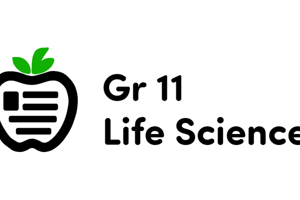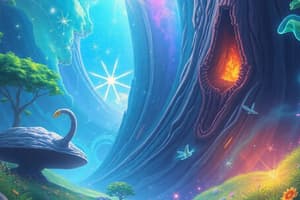Podcast
Questions and Answers
What is life defined as?
What is life defined as?
Any system capable of performing functions such as eating, metabolizing, excreting, breathing, moving, growing, reproducing, and responding to external stimuli.
Which of the following are properties of life? (Select all that apply)
Which of the following are properties of life? (Select all that apply)
- Have a definite form and limited size (correct)
- Have adaptation (correct)
- Are made up of one or more cells (correct)
- Have an unlimited lifespan
- Use only chemical energy (correct)
Which of the following is NOT a characteristic of life?
Which of the following is NOT a characteristic of life?
- Growth
- Reproduction
- Communication (correct)
- Nutrition
- Sensitivity
- Movement
- Respiration
What does metabolism refer to?
What does metabolism refer to?
What is the ability of living things to produce new individuals closely resembling them called?
What is the ability of living things to produce new individuals closely resembling them called?
All living organisms are made up of cells.
All living organisms are made up of cells.
Which of the following is NOT a type of unicellular organism?
Which of the following is NOT a type of unicellular organism?
Which of the following theories on the origin of life proposes that living organisms arise from non-living things?
Which of the following theories on the origin of life proposes that living organisms arise from non-living things?
What scientist conducted an experiment with meat in jars to test the spontaneous creation of maggots?
What scientist conducted an experiment with meat in jars to test the spontaneous creation of maggots?
What scientist challenged Redi's experiment with broth and boiling?
What scientist challenged Redi's experiment with broth and boiling?
Which scientist refined Needham's experiment with broth and boiling?
Which scientist refined Needham's experiment with broth and boiling?
What scientist conducted the Swan Neck experiment?
What scientist conducted the Swan Neck experiment?
Which theory on the origin of life is supported by scientific evidence and states that living things always arise from preexisting organisms?
Which theory on the origin of life is supported by scientific evidence and states that living things always arise from preexisting organisms?
The abiogenetic theory proposes that living things can arise from inanimate sources.
The abiogenetic theory proposes that living things can arise from inanimate sources.
What theory proposes that life came from outer space?
What theory proposes that life came from outer space?
Which of the following is NOT a unifying theme of life?
Which of the following is NOT a unifying theme of life?
All living things work as a system, but can be separated from non-living things.
All living things work as a system, but can be separated from non-living things.
The field of science has little impact on the lives of organisms.
The field of science has little impact on the lives of organisms.
How does modern biology change human's everyday lives?
How does modern biology change human's everyday lives?
Flashcards
Abiogenesis
Abiogenesis
The idea that living organisms can arise from non-living matter.
Biogenesis
Biogenesis
The idea that living organisms come only from other living organisms.
Basic Unit of Life
Basic Unit of Life
A cell is the fundamental structural and functional unit in living organisms.
Structure-Function Relationship
Structure-Function Relationship
Signup and view all the flashcards
Heredity
Heredity
Signup and view all the flashcards
Interdependence
Interdependence
Signup and view all the flashcards
Autotroph
Autotroph
Signup and view all the flashcards
Heterotroph
Heterotroph
Signup and view all the flashcards
Homeostasis
Homeostasis
Signup and view all the flashcards
Adaptation
Adaptation
Signup and view all the flashcards
Evolution
Evolution
Signup and view all the flashcards
Biological Systems
Biological Systems
Signup and view all the flashcards
Cellular Basis
Cellular Basis
Signup and view all the flashcards
Reproduction & Inheritance
Reproduction & Inheritance
Signup and view all the flashcards
Interaction with Environment
Interaction with Environment
Signup and view all the flashcards
Energy and Life
Energy and Life
Signup and view all the flashcards
Regulation/Homeostasis
Regulation/Homeostasis
Signup and view all the flashcards
Adaptation
Adaptation
Signup and view all the flashcards
Evolution
Evolution
Signup and view all the flashcards
Biology & Society
Biology & Society
Signup and view all the flashcards
Study Notes
Introduction to Life Science
- Life Science investigates living organisms
- Key learning outcomes include discovering the origin of life, understanding unifying life themes and creating ecosystems
- Life is defined as any system capable of actions like eating, metabolizing, excreting, breathing, moving, growing, reproducing, and reacting to external stimuli
Life Properties
- Living things have a definite form and limited size
- Living things have a limited lifespan
- Living things are composed of one or more cells
- Living things use only chemical energy
- Living things adapt
7 Characteristics of Life
- Nutrition: Metabolism encompasses all the chemical processes in an organism
- Movement: The ability of an organism to move
- Reproduction: Producing new individuals similar to parents
- Respiration: Anabolism, the process of building up, is crucial in respiration; using the energy of food
- Excretion: Removing waste and excess water from the body
- Growth: Increase in size and number of cells and organs
- Sensitivity: Responding to environmental stimuli
Cell
- All living organisms are made of cells—the basic unit of life
- Unicellular Organisms: Composed of a single cell performing all functions
- Examples: Paramecium, Amoeba, Bacteria, and Yeast
- Multicellular Organisms: Rely on many specialized cells to function
- Examples: Insects, Humans, and Plants
Theories on the Origin of Life
- Special Creation Theory: Life was created by a divine being
- Spontaneous Generation Theory: Living things arise from non-living matter
- Francesco Redi disproved spontaneous generation via his maggot experiment demonstrating maggots arise from fly eggs
- John Needham challenged Redi's work but also was disproved. He showed microbial growth.
- Lazzaro Spallanzani further disproved Needham by heating broth in sealed bottles- this proved a sealed system would remain sterile longer.
- Louis Pasteur proved spontaneous generation is false with his swan-neck experiment
- Biogenetic Theory: Living things always arise from preexisting living entities
- Other theories include "Beneath the Ice", "Lightning!", "Panspermia", and "RNA World"
Unifying Themes of Life
- Biological Systems: Living things work as integrated systems, interacting with non-living things
- Cellular Basis of Life: Cells are the fundamental unit of life in all organisms
- Form and Function: Structures have functions that match their shapes
- Reproduction & Inheritance: Traits of parents are passed onto offspring
- Interaction with the Environment: Living things interact with and depend on their surroundings
- Energy & Life: Autotrophs use light for energy, while heterotrophs consume other organisms
- Regulation/Homeostasis: Internal stability is essential for normal bodily functions
- Adaptation: Organisms adapt to changes in their environments
- Evolution: Life's diversity arises from change that leads to present biodiversity
- Biology & Society: Research impacts organisms' lives.
Studying That Suits You
Use AI to generate personalized quizzes and flashcards to suit your learning preferences.



